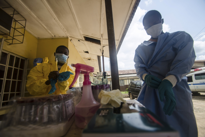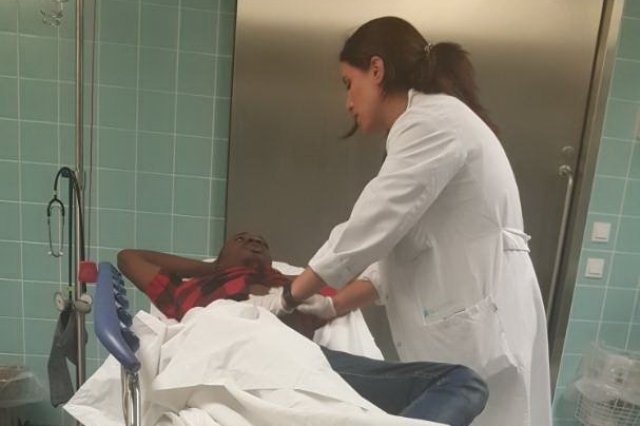Ebola Outbreak: Welsh Woman Quarantined amid Fears She May Have Virus

|
Getting your Trinity Audio player ready...
|
 A woman from Wales has asked to be placed in voluntary quarantine
A woman from Wales has asked to be placed in voluntary quarantine
after becoming concerned she may have contracted the deadly Ebola
virus after visiting a West African country where the disease is rife.
The woman, who has not been identified, is said by doctors to have
spent the last week at home in Cardiff where she is being "closely
monitored", according to health officials. She is not being visited
but is receiving daily phone calls to check on her condition. The
quarantined woman is "currently staying away from work and limiting
contact with other people voluntarily", says Public Health Wales
(PHW). She will be quarantined for 21 days, the maximum length of
incubation for Ebola. It is not thought the woman concerned has shown
any symptoms of carrying Ebola, which has now killed at least 887
people in west Africa – the worst-ever outbreak of the virus, for
which there is currently no cure. Initial symptoms include, fever,
muscle pain, sore throat and intense weakness. Later symptoms include
diarrhoea, impaired liver and kidneys, and in some cases internal and
external bleeding. Several other people across the UK have voluntarily
quarantined themselves after returning from the affected region. None
have shown any symptoms associated with carrying the virus. None of
the locations of the quarantined people have been revealed. "There are
other people in the UK, not in Wales, but we are aware of other people
that have come back from affected countries and have been at risk
because whatever they have done while they have been over there," says
Anna Humphries of Public Health Wales. "They have been in a similar
situation and they have been monitored for an incubation period to
check they have not gone onto develop symptoms. There is a process for
dealing with returning travellers and this is an example of that.
Quarantine really depends on where exactly they have been." The
outbreak is being taken so seriously that British Airways has
cancelled flights to Sierra Leone and Liberia until the end of August.
In Italy far-right politician Fabio Rolfi sparked widespread
condemnation when he said that all people arriving from sub-Saharan
Africa should be placed in quarantine. Last week head of the World
Health Organisation Dr. Margaret Chan warned of a global catastrophe
unless the disease was adequately contained: "It is taking place in
areas with fluid population movements over porous borders, and it has
demonstrated its ability to spread via air travel, contrary to what
has been seen in past outbreaks."
IB TIMESA woman from Wales has asked to be placed in voluntary
quarantine after becoming concerned she may have contracted the deadly
Ebola virus after visiting a West African country where the disease is
rife. The woman, who has not been identified, is said by doctors to
have spent the last week at home in Cardiff where she is being
"closely monitored", according to health officials. She is not being
visited but is receiving daily phone calls to check on her condition.
The quarantined woman is "currently staying away from work and
limiting contact with other people voluntarily", says Public Health
Wales (PHW). She will be quarantined for 21 days, the maximum length
of incubation for Ebola. It is not thought the woman concerned has
shown any symptoms of carrying Ebola, which has now killed at least
887 people in west Africa – the worst-ever outbreak of the virus, for
which there is currently no cure. Initial symptoms include, fever,
muscle pain, sore throat and intense weakness. Later symptoms include
diarrhoea, impaired liver and kidneys, and in some cases internal and
external bleeding. Several other people across the UK have voluntarily
quarantined themselves after returning from the affected region. None
have shown any symptoms associated with carrying the virus. None of
the locations of the quarantined people have been revealed. "There are
other people in the UK, not in Wales, but we are aware of other people
that have come back from affected countries and have been at risk
because whatever they have done while they have been over there," says
Anna Humphries of Public Health Wales. "They have been in a similar
situation and they have been monitored for an incubation period to
check they have not gone onto develop symptoms. There is a process for
dealing with returning travellers and this is an example of that.
Quarantine really depends on where exactly they have been." The
outbreak is being taken so seriously that British Airways has
cancelled flights to Sierra Leone and Liberia until the end of August.
In Italy far-right politician Fabio Rolfi sparked widespread
condemnation when he said that all people arriving from sub-Saharan
Africa should be placed in quarantine. Last week head of the World
Health Organisation Dr. Margaret Chan warned of a global catastrophe
unless the disease was adequately contained: "It is taking place in
areas with fluid population movements over porous borders, and it has
demonstrated its ability to spread via air travel, contrary to what
has been seen in past outbreaks."
IB TIMES





